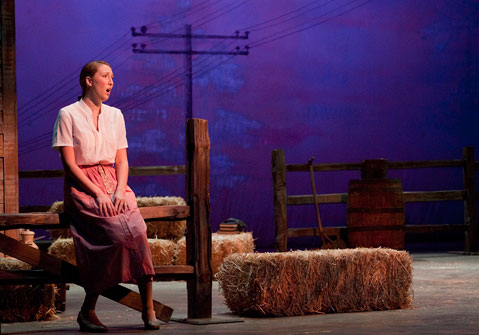The Tender Land at UCSB’s Lotte Lehmann Concert Hall
UCSB Music and Opera Theatre Presented Aaron Copland’s Classic American Opera on May 1

This fine production provided a great opportunity for fans of American music and theater to reevaluate one of the most underappreciated works in the repertoire. The Tender Land, Aaron Copland’s second opera, was commissioned by NBC television in 1952 and then rejected by the network when it was delivered by Copland and librettist Erik Johns in 1954. Although it did receive a premiere at the New York City Opera later that year, the piece has since languished due to its poor critical reception—at least until recently. With excellent performances by soprano Allison Bernal as Laurie Moss and tenor Jason Thomas as Martin, UCSB’s fully staged version demonstrated the singular appeal of this bittersweet take on rural American life, which began when Copland discovered the Walker Evans photos for Let Us Now Praise Famous Men and ended as a cross between John Steinbeck’s Of Mice and Men and William Shakespeare’s Romeo and Juliet.
The curtain rises on a modest farmhouse surrounded by bales of hay and silhouetted against a big, cloudless sky. Young Beth Moss (Maddy Marquis) is playing with her doll Daniel and chatting with her grandmother, Ma Moss (a key role splendidly sung by mezzo-soprano Stephanie Turner). They are excited about the evening’s plans, which include a party to celebrate the impending graduation of Laurie from high school. When Laurie enters, the music shifts to the characteristic blend of clear melodies and slight dissonances that Copland uses throughout to indicate the tragicomic nature of life in rural America. Bass-baritone Keith Colclough plays Laurie’s doting and highly protective grandfather well, giving the old man just the right mixture of liveliness and infirmity to support the plot.
When drifters Top (Mark Covey) and Martin (Jason Thomas) show up looking for food and shelter, the audience must continuously work to resolve their motives. Have these two been up to no good, or are they suspicious merely because they are strangers? Grandpa Moss shares our concern and the three articulate it in a song that emphasizes the themes of small-town insularity and hostility to outsiders. Later, when Top reveals his plan to get Grandpa drunk during the party so that he can get acquainted with Laurie, the two seem sinister.
The splendid party scene that begins Act Two features a square dance that’s both innocent and full of foreboding. When Top’s seduction plan fails, we are relieved, but then Martin connects with Laurie and their first kiss coincides with the untimely return of Grandpa to the stage. In the meantime, Ma Moss has sent an emissary to the sheriff to determine if these are the same two drifters who have been causing trouble elsewhere in the county. Copland’s decisive revision of his predecessors comes at the moment of confrontation. Grandpa has caught Laurie with Martin, but the word from the sheriff is that the bad guys were already apprehended, exposing Ma’s fear of Top and Martin as unfounded. In the meantime, Laurie has fallen hard for Martin. The short Act Three describes the denouement. Martin and Top have been asked to leave despite the sheriff having cleared their names. Laurie agrees to elope with Martin, but Top talks Martin out of the plan, and the two men leave without her. There’s a wonderful variation on the Romeo and Juliet balcony scene, and a great duet between the lovers at dawn, but the end finds lovelorn Laurie walking out on her graduation day in order to face life on the road alone. Director Benjamin Brecher and music director Paul Sahuc are to be commended for the fine job they have done in presenting this wonderful and enigmatic American classic.



